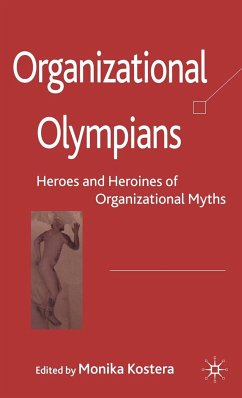

PAYBACK Punkte
20 °P sammeln!






The second volume in a series of three focuses on organizational virtues and vices, as well as abilities of organizations, and legendary organizations that have become mythical in themselves. These narratives are presented as organizational sagas to reveal an archetypal dimension of organizing and organizations.
Dieser Download kann aus rechtlichen Gründen nur mit Rechnungsadresse in A, B, BG, CY, CZ, D, DK, EW, E, FIN, F, GR, HR, H, IRL, I, LT, L, LR, M, NL, PL, P, R, S, SLO, SK ausgeliefert werden.
MARIA AGGESTAM is a Researcher at the University of Lund, Sweden GABRIELLE DUREPOS is a Lecturer in Organizational Behaviour in the Sobey School of Business at Saint Mary's University, Nova Scotia, Canada DANIEL ERICSSON is Assistant Professor in Business Administration at the School of Management and Economics, Växjö University, Sweden. He is also responsible for the Swedish Police's executive development program ULLA ERIKSSON-ZETTERQUIST received her Ph.D. at School of Business, Economics and Law, Göteborg University, Sweden, and is now a researcher at Gothenburg Research Institute in the same school YIANNIS GABRIEL is a Professor of Organizational Theory at Royal Holloway, University of London, UK GIUSEPPE GROSSI is Associate Professor in Public Management at Siena University, Italy. He is been visiting scholar at Stockholm University, Sydney University, and Leon Kozminski Academy of Entrepreneurship and Management, Warsaw, Poland JEAN HELMS MILLS is an Associate Professor of Management at Saint Mary's University, Nova Scotia, Canada. Jean is Associate Editor (The Americas) for Culture and Organization and serves on the editorial boards of Gender, Work& Organization, Management and Organizational History, Equal Opportunities International and The Journal of Workplace Rights. Currently, she is Vice President of Communications for The Administrative Sciences Association of Canada JERZY KOCIATKIEWICZ is currently a Lecturer in marketing at the University of Essex,UK, having previously dabbled in sociology, organization theory, and science and technology studies in Poland and Sweden MONIKA KOSTERA is Ordinary professor in Management, Professor at Växjö University and Warsaw University, Poland KATJA LINDQVIST is Assistant Professor at the School of Business and Lecturer at the International Curator Management Education at Stockholm University, Sweden ALBERT J. MILLS is Director of the PhD in Management at Saint Mary's University, Nova Scotia, Canada PERNILLA NILLSON is a Ph.D. student at Umeå School of Business, Sweden MARTIN PARKER works at the University of Leicester School of Management, UK KYM THORNE is the Open Universities Programme Director and Supported Researcher in the School of Commerce; at the University of South Australia
Produktdetails
- Verlag: Palgrave Macmillan UK
- Seitenzahl: 196
- Erscheinungstermin: 25. Juni 2008
- Englisch
- ISBN-13: 9780230583603
- Artikelnr.: 45963287
'Monika Kostera has completed an extensive book project of not only one edited volume but altogether three volumes in her trilogy on organizational myths, epics and sagas...[she] has succeeded very well in this endeavor: the trilogy reflects her genuine insights and extensive experience in this field of research. It was a pleasure to read chapters that addressed the themes from many versatile angles yet created a consistent whole, written by authors from many different nationalities and backgrounds...These books are recommended reading for those already familiar with organizational myths and metaphors, but are also very accessible for those less familiar with the mythical side of organizational life. In fact, one wishes that many mainstream management courses, with prevalent modernistic assumptions of rationality and linearity, inherent in mainstream business studies, would include one of these books in their reading list to broaden students' horizons and generate a deeper understanding of the complexities of organizational life.' - Scandinavian Journal of Management
Für dieses Produkt wurde noch keine Bewertung abgegeben. Wir würden uns sehr freuen, wenn du die erste Bewertung schreibst!
Eine Bewertung schreiben
Eine Bewertung schreiben
Andere Kunden interessierten sich für











